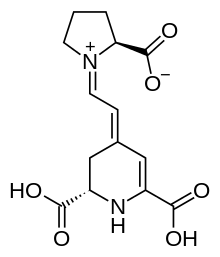Indicaxanthin
Indicaxanthin is a type of betaxanthin, a plant pigment present in beets, in Mirabilis jalapa flowers,[1] in cacti such as prickly pears (Opuntia sp.) or the red dragonfruit (Hylocereus costaricensis). It is a powerful antioxidant.
 | |
| Names | |
|---|---|
| IUPAC name
4-[2-(2-Carboxy-pyrrolidin-1-yl)-vinyl]-2,3-dihydro-pyridine-2,6-dicarboxylic acid | |
| Identifiers | |
| |
3D model (JSmol) |
|
| ChemSpider | |
PubChem CID |
|
| UNII | |
CompTox Dashboard (EPA) |
|
| |
| |
| Properties | |
| C14H16N2O6 | |
| Molar mass | 308.29 g/mol |
Except where otherwise noted, data are given for materials in their standard state (at 25 °C [77 °F], 100 kPa).
Infobox references | |
Medical uses
It has been shown in a spectrophotometric study for patients with thalassemia, that indicaxanthin can reduce perferryl-Hb generated in solution from met-Hb and hydrogen peroxide, more effectively than either trolox (a vitamin E derivative) or vitamin C, possibly interfering with perferryl-Hb, a reactive intermediate in the hydroperoxide-dependent Hb degradation.[2]
Indicaxanthin in antioxidant studies was more effective than Trolox at scavenging the ABTS cation radical.[3]
See also
References
- Piattelli, M.; Minale, L.; Nicolaus, R.A. (1965). "Pigments of centrospermae—V. : Betaxanthins from Mirabilis jalapa L.". Phytochemistry. 4 (6): 817–23. doi:10.1016/S0031-9422(00)86258-5.
- Tesoriere, L.; Allegra, M.; Butera, D.; Gentile, C.; Livrea, M. A. (2006). "Cytoprotective effects of the antioxidant phytochemical indicaxanthin in β-thalassemia red blood cells". Free Radical Research. 40 (7): 753–61. doi:10.1080/10715760600554228. PMID 16984002.
- Butera, Daniela; Tesoriere, Luisa; Di Gaudio, Francesca; Bongiorno, Antonino; Allegra, Mario; Pintaudi, Anna Maria; Kohen, Rohn; Livrea, Maria A. (2002). "Antioxidant Activities of Sicilian Prickly Pear (Opuntia ficus indica) Fruit Extracts and Reducing Properties of Its Betalains: Betanin and Indicaxanthin". Journal of Agricultural and Food Chemistry. 50 (23): 6895–901. doi:10.1021/jf025696p. hdl:10447/107910. PMID 12405794.
This article is issued from Wikipedia. The text is licensed under Creative Commons - Attribution - Sharealike. Additional terms may apply for the media files.